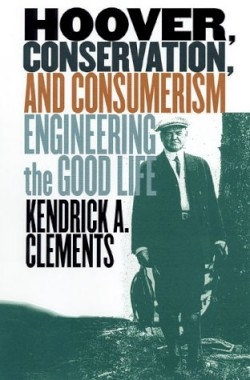Hoover, Conservation, and Consumerism
Engineering the Good Life
Before Richard Nixon, Herbert Hoover was the president that Americans loved to hate. Clements, an environmental historian at the University of South Carolina, demonstrates that Hoover’s failed conservation policies during the Depression significantly contributed to his reputation as a mean-spirited, inflexible chief executive, more concerned about businesses than people. Hoover, however, as the author shows, was more complex and caring than his image; he enjoyed notable successes as an administrator and humanitarian during his service as head of relief agencies during and following World War I and as Secretary of Commerce.
Hoover was very much a product of his time and his Quaker upbringing. He believed that a well-planned conservation program was possible with minimal federal support—a notion roughly disabused for the public, if not Hoover, by the Depression— that would lead to a rising standard of living for all Americans and to a moral society. Despite his conservatism, the future president accepted the Progressive era view of natural resources being unlimited, a legacy from the recently closed frontier. He spent the little free time he had as a child enjoying fishing, hiking and other outdoor activities. Although he would later romanticize his childhood and become unsympathetic towards government relief programs, as president he advocated, although did not generously support, anti-water pollution measures, fisheries protection and restocking rivers.
Hoover headed the Commission for the Relief of Belgium during World War I, a largely volunteer organization that remarkably fed nine million people in Belgium and German-occupied Northern France. President Wilson appointed him head of the American Relief Association, where in addition to more success he developed over-inflated positions about the importance of volunteerism and decentralized government.
From 1921-28 Hoover served as Secretary of Commerce under presidents Harding and Coolidge, and was boosted to the presidency in 1928 in no small measure due to his relief efforts during the great Mississippi flood of 1927, an event of natural devastation, loss of land and lives and racism, well summarized here, and compellingly told by John Barry in Rising Tide: The Great Mississippi Flood of 1927 and How it Changed America.
Hoover was more aware of the need for conservation than most of his contemporaries but his unshakeable faith in voluntarism and small government for all circumstances made his proposals “sadly inadequate,” Clements observes. Much like Lyndon Johnson, who was brought down by a war he could not win, Hoover was defeated by an unprecedented economic catastrophe he couldn’t or wouldn’t effectively respond to. Restoring public confidence, if not the economy, would be the contribution of Franklin Roosevelt, Hoover’s successor. Clements makes skilled use of personal papers, oral histories, dissertations and special collections to present an exhaustive assessment of Hoover’s conservation policies, which exemplify the extraordinary success and dismal failure experienced by this multifaceted public official and president.
Reviewed by
Karl Helicher
Disclosure: This article is not an endorsement, but a review. The publisher of this book provided free copies of the book to have their book reviewed by a professional reviewer. No fee was paid by the publisher for this review. Foreword Reviews only recommends books that we love. Foreword Magazine, Inc. is disclosing this in accordance with the Federal Trade Commission’s 16 CFR, Part 255.

